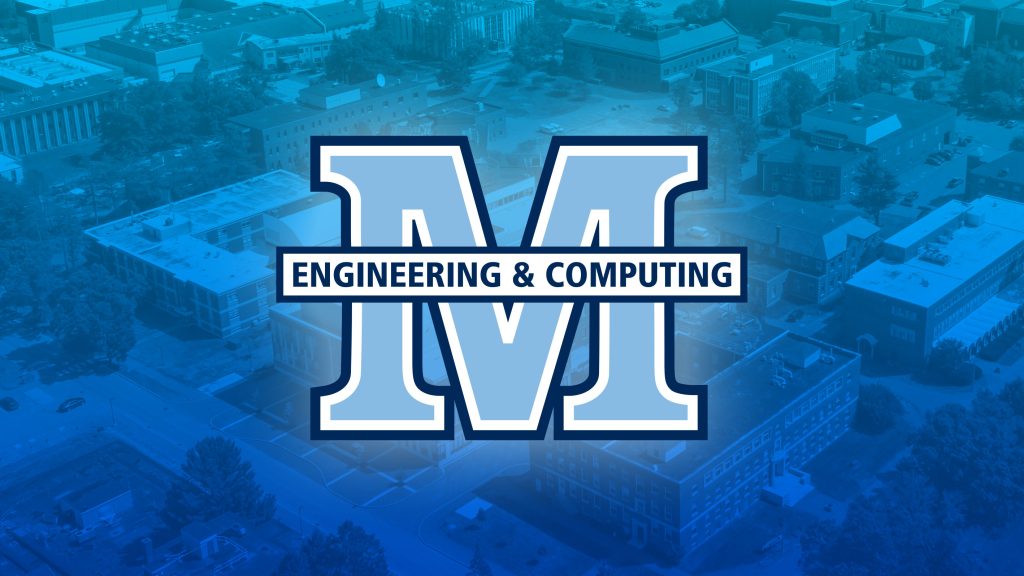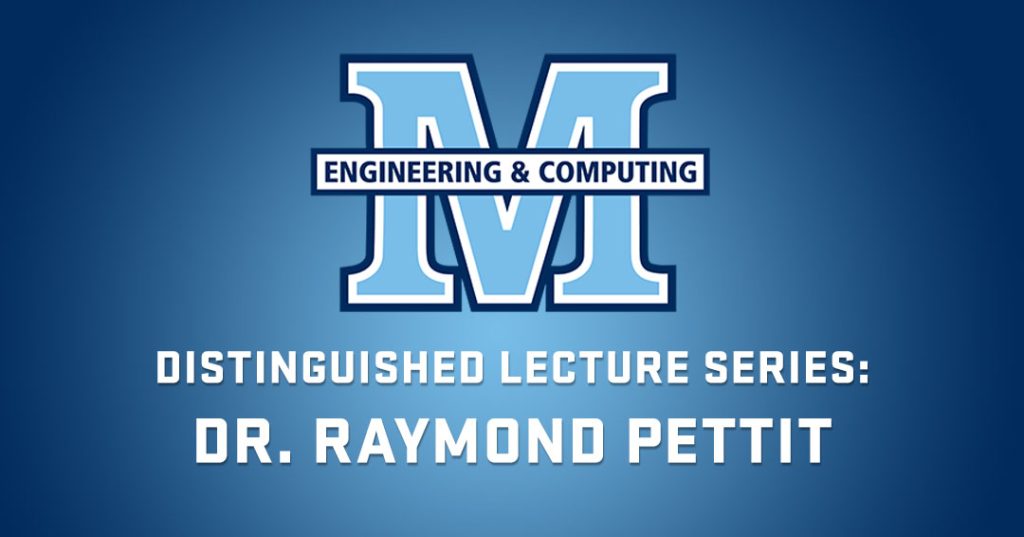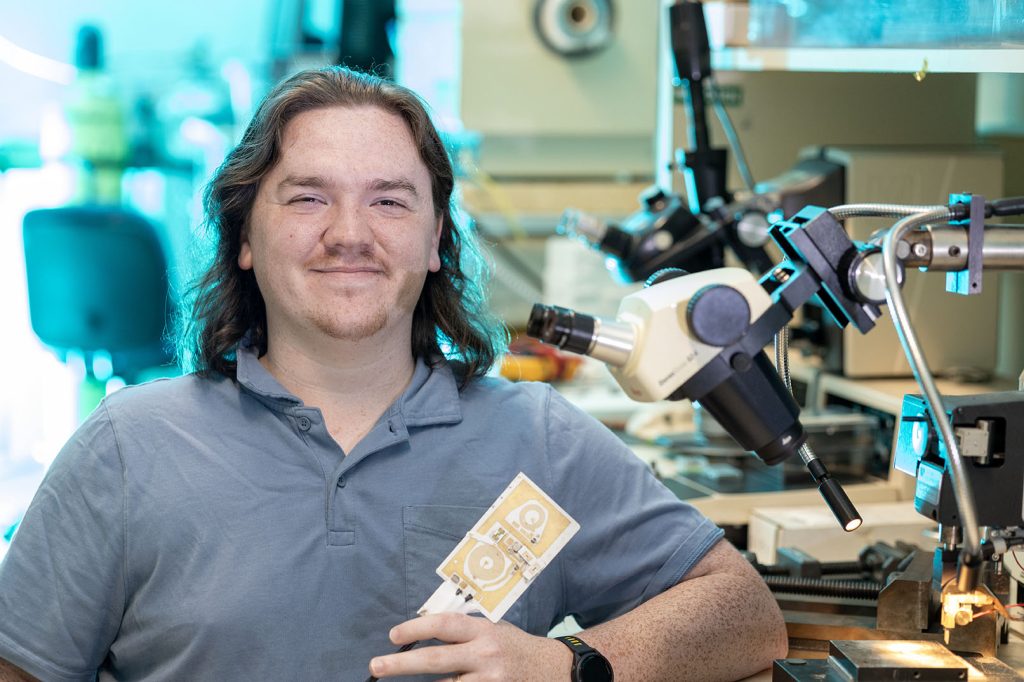Chemical & Biomedical Engineering
Graduate Programs
Dive into cutting-edge graduate programs where innovation drives real-world impact. Whether your passion lies in Chemical or Biomedical Engineering, you’ll gain advanced knowledge and hands-on experience to tackle global challenges in energy, healthcare, and sustainability. Choose from a range of flexible pathways—including accelerated, master’s, and doctoral degrees—and join a community of forward-thinking engineers shaping the future of technology and human health.
The Department of Chemical and Biomedical Engineering has well-established graduate programs in chemical engineering (M.S. and Ph.D.) and biomedical engineering (M.S.). A Ph.D. in biomedical engineering is available through the Graduate School of Biomedical Sciences and Engineering. Students work closely with faculty in a tight-knit, collegial community on a diverse research portfolio funded by NSF, NIH, DoD, DoE, USDA, etc. (totaling approximately $7 million annually in recent years). Our graduate program is designed to prepare students for careers in research and development, both in industry and in academia, centered around four core research areas:
- Sustainable Energy
- Advanced Materials
- Biomedical Imaging
- Biomedical Devices
graduate coordinator
Thomas Schwartz
Biomedical ProgramS
The Master of Science in Biomedical Engineering prepares students to conduct research involving the application of engineering to biological systems.
- Examples of research projects are sensors to detect specific biological molecules or pathogens in food or water, imaging of cells or proteins, conformation of biological molecules at membrane surfaces, controlling the interaction of microbes and cells with surfaces as well as environmental risk assessment modeling.
- Alliances with several governmental agencies and other organizations:
- Instrumentation Laboratories, the Jackson Laboratory, IDEXX, MDI Biological Labs, and Eastern Maine Medical Center, increase research opportunities related to genetics and biomedical issues in engineering. Cooperation with the Laboratory for Surface Science and Technology gives access to tools related to surface analysis.
- A thesis and a total of 30 hours of graduate credits are needed to fulfill the master’s degree requirements.
- Masters of Science in Biomedical Engineering
- Masters of Science in Biomedical Engineering
- PhD in Biomedical Engineering
- The doctoral program in Biomedical Engineering is housed within The Graduate School of Biomedical Science and Engineering (GSBSE).
- Program Requirements
- During their first year, Ph.D. students complete four core modules (BMS 625). Individual programs of study are then developed for each student with coursework relevant to their research topic. In addition to core coursework, during their first year in the program Ph.D. students undertake a minimum of three laboratory research rotations hosted by faculty members in at least two of the five partner institutions. Students also have the option to do a fourth rotation. At the end of or during the rotation sequence, students identify their dissertation mentor and project.
- Research findings are disseminated through national and international conferences, publication in high-profile scientific journals, and the patent literature. Numerous research opportunities and a generous stipend combine to create a highly competitive GSBSE Ph.D. program. Interested applicants are encouraged to request further information.
- Advising
- Orientation for new graduate students will be scheduled the week before the start of the Fall semester. New students should plan to attend.
- Once accepted into the Ph.D. in Biomedical Engineering program, and prior to the identification of a dissertation mentor, students will be advised by the First Year Advisory Committee (FYA). There is a FYA committee member at each partner institution, a listing of the committee composition may be found here. Issues and questions relating to laboratory rotations and coursework should be discussed with a FYA committee member. This FYA faculty member will maintain a role as an informal adviser and graduate student advocate, and will offer guidance throughout the student’s program, as necessary.
Questions or issues regarding registration for classes should be directed to the GSBSE office at gsbse@maine.edu.
By the time the student has completed three or four rotations, the student will have chosen a home laboratory and assembled a dissertation committee. The role of advising in the academic programs will then fall to the mentor.
Chemical Programs
The M.S. degree in Chemical Engineering normally involves a thesis and is usually completed within two years.
For students who enter the program with a recognized B.S. degree in chemical engineering, the M.S. degree requires 30 semester hours of graduate work which must include two seminars and six term courses in addition to the thesis.
Students holding a B.S. degree in science or other engineering disciplines are also eligible for admission to the M.S. program, although additional make-up courses may be required.
Required core courses for the M.S. degree are CHE 510, CHE 540, CHE 561 and CHE 580.
Doctor of Philosophy (Ph.D.) in Chemical Engineering
Study for the Ph.D. degree usually requires four years. Students whose ultimate goal is to obtain that degree are advised to apply directly to the Ph.D. program.
The Ph.D. degree requires a minimum of 45 semester hours, beyond the B.S. level, comprising four seminars and at least eight graduate courses (24 credits) in addition to a research thesis. Ph.D. candidates are also required to pass a qualifying examination on chemical engineering fundamentals and to propose and successfully defend a thesis proposal.
Students who enter the program with a recognized Master’s degree may be allowed up to 30 course credits towards the Ph.D., subject to approval by the Graduate Committee of the Department.
Required core courses for the Ph.D. degree are CHE 510, CHE 540, CHE 561, and CHE 580.
How to Apply to UMaine CBE
Students are accepted into the program for start dates in either the Fall or Spring semester, although the majority of graduate students begin in the Fall semester. Applications must be received at least three months prior to the start of the term. For priority admission for the Fall semester, it is recommended to submit applications before Jan 20 of that year.
Information about the online application and materials can be found at the UMaine Graduate School, which sets the admission procedures for graduate study. The application is submitted electronically. Standard requirements for admission to both the chemical and biomedical engineering graduate programs administered by CBE (i.e., M.S. in CHE and BME and Ph.D. in CHE) include original copies of transcripts, letters from three references, and a personal statement describing the applicant’s motivation for graduate study.
Frequently Asked Questions
Are the GREs required?
Our department began waiving the requirement for GRE test scores at the beginning of the COVID-19 pandemic. Presently, we do not require GRE scores, although this requirement is subject to change. If the GRE becomes required again, we will post notification on this page at least one year prior to the change taking effect.
Do I need to contact potential advisors prior to applying?
No – students are matched to advisors during the first month of graduate study, so there is no need to contact faculty requesting to join their research group. Moreover, it is often difficult for faculty to determine more than a month or two ahead of time whether they will take students in a given semester. However, you may still want to contact individual faculty to learn more about their research programs.
Is there funding available/How do I apply for funding?
All applicants are automatically considered for funding as either a Research Assistant or a Teaching Assistant. However, funding is not guaranteed. There is no separate application for funding, and if made an offer of admission your offer letter will also include details about any potential assistantships you have received.
Can the application fee be waived?
Generally the answer is no, except in truly exceptional circumstances. Unfortunately, the application fee cannot be waived due to financial hardship. The Graduate School lists some application fee waiver options on their FAQ site.
If I send you my application materials before applying, can you tell me if I would be admitted?
No – the only way to have application materials evaluated is to submit a formal application for admission.
My undergraduate degree is not in Chemical or Biomedical Engineering. Would I be admitted?
We do admit students whose background is not in Chemical or Biomedical Engineering, although these students are generally required to take some number of prerequisite engineering courses. The particular courses depend on your background and will be determined by the admissions committee when making a decision. Note that some prerequisite courses may not count for graduate credit and may not be eligible for tuition coverage by an RA or TA position.
Is an English Language Test required?
An English language proficiency exam is not needed if your undergraduate (or master’s) degree was taught in English or if English is an official language of your home country. The Graduate School accepts TOEFL, IELTS, Duolingo, and PTE test scores.
When can I expect a decision regarding my application?
Applications are generally reviewed in the Fall semester for Spring admission and in the Spring semester for Fall admission. If you have submitted an application for the Fall semester, please wait until late March before inquiring about the status of your application. If you have submitted an application for the Spring semester, please wait until early December before inquiring.
I was not admitted – what went wrong?
The admissions process is highly competitive, with many applications received for only a small number of positions. Successful applicants have very high GPAs, high test scores, detailed and well-written personal statements, and very strong, detailed, and personalized letters of recommendation from those who are qualified to assess a student’s potential for graduate study. If your application was not successful and you wish to reapply, then we recommend highlighting the areas where you feel you are the strongest, keeping in mind the qualities of successful applicants above.
Other FAQs
Answers to other frequently asked questions can be found on the Graduate School’s FAQ website.
MCEC NEWS






